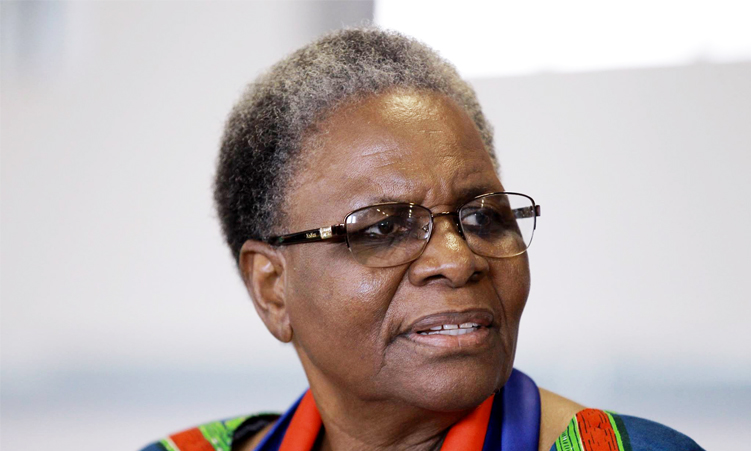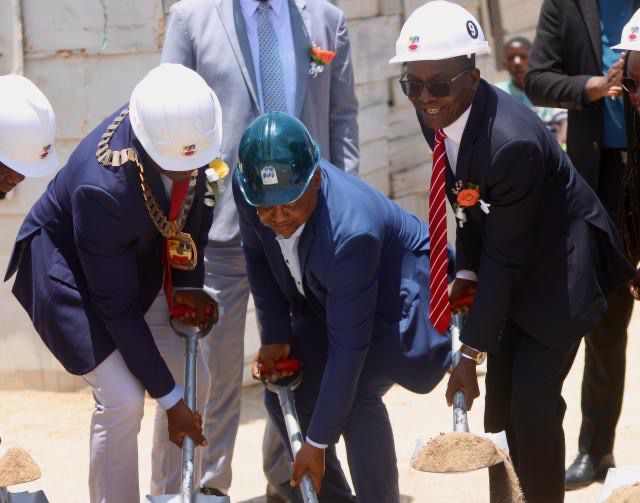THE Supreme Court yesterday reserved its judgement on the appeal in which the State has asked it to overturn the High Court decision that had freed the Caprivi 13 accused of high treason.
The 13 Caprivi high treason suspects effectively escaped being tried because of alleged irregularities in the way they had been brought before court in Namibia. Having heard arguments on the appeal over the past two days, acting Chief Justice Johan Strydom late yesterday afternoon told legal counsel appearing before the Supreme Court that the court was reserving its judgement on the appeal that the State had lodged against the judgement of Judge Elton Hoff in the High Court at Grootfontein on February 23.The acting Chief Justice also said that it appeared highly unlikely that the court would be giving an order setting out the results of the appeal, with reasons for its decision to follow only later.He made the statement apparently in answer to a possibility that was raised by Jeremy Gauntlett, SC, on Monday, when he asked the court to consider giving an order on the appeal while handing down reasons for its decision later.Gauntlett represented the State in the appeal, Gauntlett had explained that, in light of the fact that the Caprivi high treason case is set to return to the High Court at Grootfontein on June 1, and that the State was trying to avoid another postponement of the long-pending case, it would help to have the result of the appeal available by June 1.That prospect now appears unlikely, and a further delay in the start of the prosecution in the treason case – in which 107 accused remain before the High Court at Grootfontein – appears virtually certain.They have already pleaded not guilty to all 278 charges against them.UNPRECEDENTEDActing Chief Justice Strydom remarked yesterday that the Supreme Court would need to take its time to arrive at its decision, which would have to be able to stand the test of time and would be setting a precedent.The case raised before Judge Hoff and that reached the end of the legal line before the Supreme Court this week, is setting a precedent in Namibian law since it is the first time that a special plea on jurisdiction – in terms of which the accused are disputing the court’s jurisdiction to try them – has been raised.The ruling was based on claims that the accused were abducted from another country in order to be brought to Namibia to be put on trial.In his ruling on the jurisdiction plea, Judge Hoff did not find that the 13 high treason accused had been abducted to Namibia in the sense of having been kidnapped by force.He also found that it had not been shown that the Namibian authorities acted in connivance or collusion with their counterparts in Botswana or Zambia to have the 13 handed over.He, however, found that the evidence presented during a twenty-day-long hearing, showed that in spite of extradition arrangements between Namibia and Zambia and Botswana, these were not followed when the 13 were handed over to Namibian officials on five separate occasions between August 1999 and December 2002.He found that a Namibian request for the handover of people who had been suspected of involvement in the August 2 1999 attacks at Katima Mulilo had tainted the deportation of the 13 from Zambia and Botswana to Namibia.He therefore ruled that the 13 were before the High Court irregularly, through a process of “disguised extradition”, or, in the case of one, without him having properly consented to be brought to Namibia to face charges.The result was that Judge Hoff ruled that his court did not have the jurisdiction to try them.ABDUCTION, OR NOT?The counsel for the 13, Patrick Kauta, continued to argue yesterday that an abduction – even if not in the sense of a kidnapping – did take place when Namibian Police or Army officers took all but two of the 13 under their control across the Namibian border, from either Zambia or Botswana, and then transported them back to Namibia.”Receiving has now become anonymous with abduction?” acting Judge of Appeal Simpson Mtambanengwe, one of the members of the five-judge bench, remarked on this score.Kauta pressed on, arguing that not only did the Zambian and Botswana authorities break their own laws by handing over the 13 without following prescribed deportation or extradition procedures.But by entering those countries and receiving the suspects there, Namibian Police and Defence Force members had also broken Namibian law by acting extra-territorially.In his reply, Gauntlett countered that both the Police Act and the Defence Act allowed just such exercise of their functions outside Namibia to the country’s Police and Defence Force.He stuck to his argument that no abduction had been proven, and that even if the Zambian or Botswana authorities had violated their own laws, Namibia could not be blamed for it and it was not up to a Namibian court to sit in judgement on other countries’ actions on their own territory.Gauntlett represented the State together with a fellow member of the Cape Town Bar, David Borgström, and Deputy Prosecutor General Herman January.Kauta was the sole legal representative for the 13.He could give no explanation when he was asked why the eight other defence counsel in the treason case, who had represented the 13 with him in the High Court, were not on hand to assist him in the appeal.Having heard arguments on the appeal over the past two days, acting Chief Justice Johan Strydom late yesterday afternoon told legal counsel appearing before the Supreme Court that the court was reserving its judgement on the appeal that the State had lodged against the judgement of Judge Elton Hoff in the High Court at Grootfontein on February 23.The acting Chief Justice also said that it appeared highly unlikely that the court would be giving an order setting out the results of the appeal, with reasons for its decision to follow only later.He made the statement apparently in answer to a possibility that was raised by Jeremy Gauntlett, SC, on Monday, when he asked the court to consider giving an order on the appeal while handing down reasons for its decision later.Gauntlett represented the State in the appeal, Gauntlett had explained that, in light of the fact that the Caprivi high treason case is set to return to the High Court at Grootfontein on June 1, and that the State was trying to avoid another postponement of the long-pending case, it would help to have the result of the appeal available by June 1.That prospect now appears unlikely, and a further delay in the start of the prosecution in the treason case – in which 107 accused remain before the High Court at Grootfontein – appears virtually certain.They have already pleaded not guilty to all 278 charges against them.UNPRECEDENTEDActing Chief Justice Strydom remarked yesterday that the Supreme Court would need to take its time to arrive at its decision, which would have to be able to stand the test of time and would be setting a precedent.The case raised before Judge Hoff and that reached the end of the legal line before the Supreme Court this week, is setting a precedent in Namibian law since it is the first time that a special plea on jurisdiction – in terms of which the accused are disputing the court’s jurisdiction to try them – has been raised.The ruling was based on claims that the accused were abducted from another country in order to be brought to Namibia to be put on trial.In his ruling on the jurisdiction plea, Judge Hoff did not find that the 13 high treason accused had been abducted to Namibia in the sense of having been kidnapped by force.He also found that it had not been shown that the Namibian authorities acted in connivance or collusion with their counterparts in Botswana or Zambia to have the 13 handed over.He, however, found that the evidence presented during a twenty-day-long hearing, showed that in spite of extradition arrangements between Namibia and Zambia and Botswana, these were not followed when the 13 were handed over to Namibian officials on five separate occasions between August 1999 and December 2002.He found that a Namibian request for the hando
ver of people who had been suspected of involvement in the August 2 1999 attacks at Katima Mulilo had tainted the deportation of the 13 from Zambia and Botswana to Namibia.He therefore ruled that the 13 were before the High Court irregularly, through a process of “disguised extradition”, or, in the case of one, without him having properly consented to be brought to Namibia to face charges.The result was that Judge Hoff ruled that his court did not have the jurisdiction to try them.ABDUCTION, OR NOT?The counsel for the 13, Patrick Kauta, continued to argue yesterday that an abduction – even if not in the sense of a kidnapping – did take place when Namibian Police or Army officers took all but two of the 13 under their control across the Namibian border, from either Zambia or Botswana, and then transported them back to Namibia.”Receiving has now become anonymous with abduction?” acting Judge of Appeal Simpson Mtambanengwe, one of the members of the five-judge bench, remarked on this score.Kauta pressed on, arguing that not only did the Zambian and Botswana authorities break their own laws by handing over the 13 without following prescribed deportation or extradition procedures.But by entering those countries and receiving the suspects there, Namibian Police and Defence Force members had also broken Namibian law by acting extra-territorially.In his reply, Gauntlett countered that both the Police Act and the Defence Act allowed just such exercise of their functions outside Namibia to the country’s Police and Defence Force.He stuck to his argument that no abduction had been proven, and that even if the Zambian or Botswana authorities had violated their own laws, Namibia could not be blamed for it and it was not up to a Namibian court to sit in judgement on other countries’ actions on their own territory.Gauntlett represented the State together with a fellow member of the Cape Town Bar, David Borgström, and Deputy Prosecutor General Herman January.Kauta was the sole legal representative for the 13.He could give no explanation when he was asked why the eight other defence counsel in the treason case, who had represented the 13 with him in the High Court, were not on hand to assist him in the appeal.
Stay informed with The Namibian – your source for credible journalism. Get in-depth reporting and opinions for
only N$85 a month. Invest in journalism, invest in democracy –
Subscribe Now!






